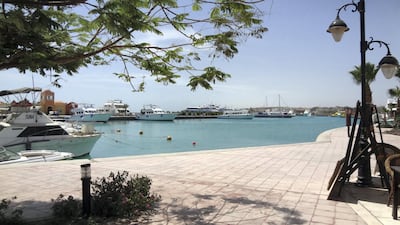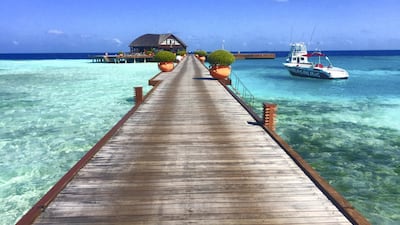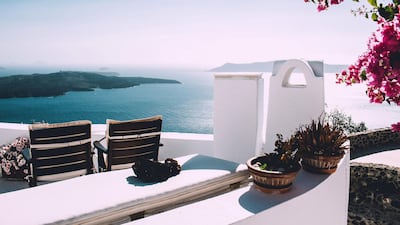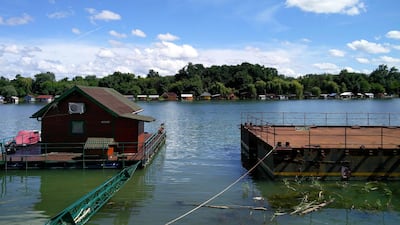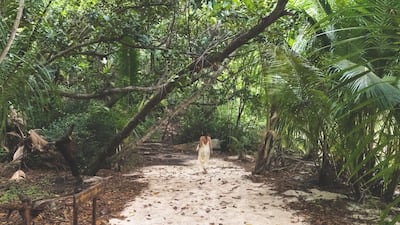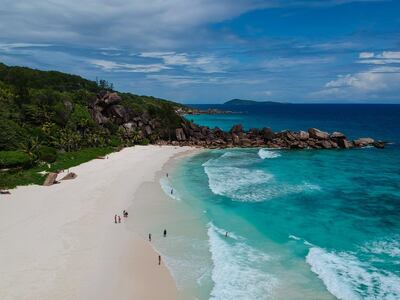It's been a long, hot summer in Abu Dhabi, with many residents staying put owing to the coronavirus. Restricted flights and uncertainty around whether residents could return to the UAE with ease meant that taking a holiday didn't seem worth the risk – until now.
With residents no longer needing permission to fly back to Abu Dhabi after travelling and several destinations reopening to international visitors, perhaps there's still time to squeeze in a last-minute summer escape.
Who can fly to Abu Dhabi?

Abu Dhabi is open for returning nationals and UAE residents, but not yet to tourists. All UAE residents, except Dubai visa holders, can now fly into Abu Dhabi without having to request permission. Dubai has its own procedures in place and residents with Dubai visas still need approval from the General Directorate of Residency and Foreign Affairs. Once this approval is given, Dubai residents can also fly to Abu Dhabi if they choose.
Do I need to take a Covid-19 test?
From August 16, all travellers flying on any Etihad flight will need a Covid-19 negative test certificate before boarding. For inbound flights, passengers also need pre-flight testing, which can be done at any reputable clinic overseas. Negative reports wil be requested by airline check-in desk staff and only passengers who have it will be allowed to fly.
Where can I fly to?
Etihad is flying from Abu Dhabi to more than 60 destinations across Asia, Australia, Europe, the Middle East and North America in August and September, so there are plenty of options for travellers. However, just because flights are operating, it doesn't mean all tourists are welcome. Travellers should check the entry requirements for specific destinations they want to visit, as some countries are not yet open to all visitors while others still have quarantine rules in place.
What if I travel and the rules change?
Travel rules and regulations are changing by the day so it’s important to know your options if this happens. All Eithad flights booked before the end of August for travel until November can be changed free of charge, which is good to know if you're thinking about flying. It's also wise – and in many places mandatory – for travellers to have insurance poliicies that cover against Covid-19-related medical costs and sudden trip cancellation. It’s also worth putting contingency plans in place regarding pets or any other responsibilities you have in the UAE, just in case your return is delayed.
Where can I go for a last minute holiday?
If you have decided that travelling is worth the risk, then there are plenty of destinations open to visitors, but remember that some may have reopened while still grappling with rising coronavirus cases.
Do your own research to make sure that wherever you travel is as safe as possible. It’s also important to check how easy it will be for you to take a Covid-19 test in your destination, as you’ll need one before you come back home.
If you’ve decided you want to travel this summer, here are five destinations worth considering...
Explore Egypt’s Red Sea coast
Fly with Etihad Airways to Cairo then take a short connecting flight to Hurghada or Sharm El Sheikh for a beachside holiday on the shores of the Red Sea. Hurghada is a good pick if you want a relaxed resort vibe, while Sharm El Sheikh offers access to laid-back Dahab – one of the best places in the country for sea adventures. August at the Red Sea is hot, but not quite as hot as the UAE. You can expect daytime temperatures to average at about 39 degrees Celsius, with cooler evenings.
Etihad has resumed daily services to Cairo with a flight time of three and a half hours. Upon arrival, there's no quarantine period, but travellers must show a negative Covid-19 test certificate, taken within 72 hours of arriving in the country. If you're flying directly to one of the tourist regions of the Red Sea, South Sinai or Marsa Matrouh, not only are you exempt from the PCR test requirements, you'll also get a free tourist visa on arrival.
Coronavirus cases in Egypt are still rising, but numbers in the tourist regions are lower than in the capital. The Egyptian tourism ministry has been busy inspecting hotels and tourist facilities, so be sure to book a resort that has been certified as safe.
It’s also worth taking your own snorkelling gear if you plan to spend time in the water. In public spaces across the country, you’ll have to wear a face mask and there are restrictions on public transport from midnight to 4am, including taxis, so arrange your airport transfer ahead of time if you have an evening flight.
Unwind in the Maldives
If you can afford it, the Maldives is a great choice for a summer break. Having reopened to tourists in July, the archipelago is a four-hour flight from Abu Dhabi and there are three flights per week with Etihad.
Travel to the Maldives is relatively simple for tourists, with no quarantine rules or Covid-19 test requirements in place. That said, there are a few rules you need to know, including that you need to submit a health form before flying and you will not be allowed to island hop – you must stay at one resort for the duration of your trip.
Face masks are required when transferring from the airport by seaplane or boat, and the airport closes daily from midnight to 6am, with special permission needed to travel there if you have a flight during these hours.
Coronavirus cases on the islands continue to rise, with 5,366 confirmed to date. Most of these are from the greater Male area, where movement restrictions and night-time curfews are in place.
It is relatively easy to socially distance on most islands in the Maldives, where resorts were built with privacy in mind. The archipelago has year-round sunshine and temperate waters – August brings highs of 30°C and lows of 25°C, with a generous helping of humidity. Summer is officially monsoon season, but the rains typically roll in for a few hours each day before the sunshine returns.
When it comes to where to stay, you'll be spoilt for choice as many of the islands have received approval by the tourism ministry to reopen. New properties include the Radisson Blu Resort Maldives, the first hotel by the Radisson group in the country, and the Kagi Maldives Spa, which will open on Tuesday, September 1.
Old favourites such as the One&Only Reethi Rah and the Four Seasons Resort Maldives are accepting guests now, while others, such as the Anantara Veli Maldives Resort or Raffles Maldives Meradhoo will remain closed until October. It's worth checking that the resort you have your eye on is open and approved.
Book a Greek getaway
Greece was one of the first countries to start welcoming tourists again when it reopened to several nationalities in June. Daily fights from Abu Dhabi take a little more than five hours to the country's capital.
New entry rules dictate that all UAE travellers must show a negative Covid-19 test certificate that's been taken no more than 72 hours before arriving in the country. These must be in English and show the passport details of each traveller. Anyone showing signs of Covid-19 may be tested again at the airport, and if this happens, they will need to stay in Athens until the results come back. All other travellers do not need to quarantine and can get on with exploring the country, so long as they commit to social distancing and wearing face masks in public spaces.
As the cradle of western civilisation, Greece offers something for everyone – from archaeological wonders in ancient Athens to sugar-cube hotels on both its famed and lesser-known islands. If you want to venture to Santorini, Milos, Mykonos, or one of the countless other Greek islands, there are options for domestic flights or ferry crossings. Cruising services have also reopened to tourists who want to spend their time on the sea.
Spend summer in Serbia

If you're craving slightly cooler climes, Serbia might be a good option. The country has reopened to tourists and Etihad will resume flights to Belgrade from Sunday, August 16, with three flights a week. The journey time is five and half hours and there are no quarantine rules in place upon arrival. Covid-19 tests are also not required for travel to Serbia.
Like many countries in the region, the virus is still very present so travellers need to be vigilant. Coronavirus-related restrictions are in place across the country. Face masks are mandatory in public spaces and bars and restaurants in the capital have to close early, so Belgrade's nightlife is probably not an incentive to visit this year.
Daytime temperatures in this Balkan country hover around the high twenties in August, with even cooler evenings. In Belgrade, where the Danube river meets the Sava, there's a wealth of things to be discovered, from the city's rich history to its delicious gastronomy. The landlocked country might not be what you think of when it comes to beachside getaways, but Belgrade's Ada Ciganlija will prove you wrong. This island in the Sava River has been turned into a peninsula and is the ideal place to spend hot summer days. The city also has history around every corner – don't miss the Kalemegdan fortress. If you want to get out of the city, Avala mountain, 16 kilometres from the centre, offers fantastic views and crisp air, a welcome change from the heat of the UAE summer.
Catch some sun in the Seychelles
Floating just a few kilometres from the coast of Africa in the Indian Ocean, the Seychelles reopened to some travellers, including those from the UAE, on August 1. Flights from Abu Dhabi take four and a half hours and Etihad flies five times per week to the archipelago, which is renowned for its white sands, pristine ocean and lush green hills.
Authorities in the Seychelles have divided nations into categories – low, medium or high-risk. Only travellers from the first two categories are currently allowed to visit. The UAE is ranked as medium-risk meaning that all travellers, including infants and children, must present a negative Covid-19 PCR test before flying to the islands. This must have been taken no more than 72 hours prior to your date of travel and should be submitted electronically before boarding your flight. Travellers also need to show authortites at the airport that they have valid health insurance that covers any Covid-19-associated medical care.
After that, you're free to visit the islands so long as you stay in accommodation that's been certified as safe by the public health authority. This list is constantly being updated and includes more than 200 hotels, resorts, villas and apartments, so there is something for everyone. If you're seeking luxury there's the Four Seasons Resort Seychelles or Constance Ephelia Resort, or can opt for total isolation in a private villa such as Sea Monkey on Mahe. More affordable options can be found at places such as Surfers Cove, Villa Roscia or Eden Island apartments. Whichever accommodation you choose, for the first seven days of any trip, you can only stay in a maximum of two hotels, resorts or boats.
August is peak season for the Seychelles, which experiences highs of 28°C and lows of 24°C. Activities on offer include snorkelling and diving, golf on lots of stunning courses, fishing trips and beaches that are ranked among the best in the world. There's also a fascinating cultural side to be found across the islands by checking out local museums, galleries, ancient tombs and plantations.
